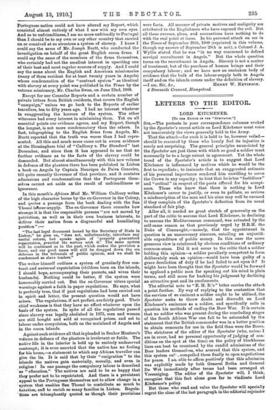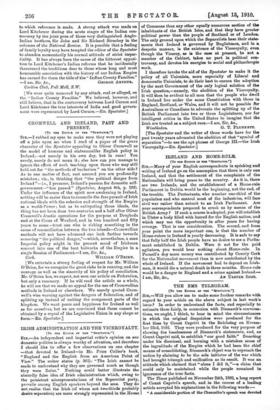LETTERS TO THE EDITOR.
LORD KITCHENER.
Pro TH1 EDITOS Or Tint " SPXCTATOL.1 Sfit,—The protests in your correspondence columns evoked by the Spectator's recent article on Lord Kitchener must voice not inaccurately the views generally held in the Army.
That the attack—for such it is held to be, however veiled— should be resented by those who keenly feel its injustice is surely not surprising. The general principles enunciated by the Spectator are just those with which so good a soldier must
necessarily be to a large extent in agreement. Yet the whole trend of the Spectator's article is to suggest that Lord Kitchener is influenced by motives which he would be the first to repudiate ; to insinuate that an exaggerated estimate of his personal importance rendered him unwilling to serve the Crown in any capacity ; to hint that he is too "fastidious" and " critical " in respect of the posts offered for his accept- ance. Those who know that there is nothing in Lord Kitchener's career to justify, or even to palliate, so serious a misdescription of the man and his aims may well be excused if they complain of the Spectator's deflection from its usual standard of fair play.
After all, it needed no great stretch of generosity on the
part of the critic to assume that Lord Kitchener, in declining to assume the Mediterranean command, was actuated by the self-same reason as that previously urged by H.R.H. the Duke of Connaught,—namely, that the appointment in question is an unnecessary sinecure, entailing an unjustifi- able expenditure of public money. In this case the more generous view is reinforced by obvious conditions of ordinary common-sense. Did it not occur to the critic that a soldier holding this opinion—a soldier peculiarly competent to form deliberately such an opinion—would have been guilty of a grave dereliction of duty if he had failed to act upon it P It might have been thought that the Spectator would be forward to applaud a public man for speaking out his mind in plain terms, and still more for backing his judgment by declining an attractive post and its emoluments.
The editorial note to "E. H. B.'s" letter carries the attack
a point further. By way of replying to the contention that the services of so eminent a soldier ought to be utilised, the Spectator seeks to throw doubt and discredit on Lord Kitchener's eminence as a soldier, and specifically calls in question his methods of ending the Boer War. It is certain that no soldier who was present daring the concluding stages of the South African War can fail to be astounded by the statement that the British commander was in a better position to obtain remounts for use in the field than were the Boers. The strictures of the editor of the Spectator (who, nnles 3 I am in error, had no personal opportunity of judging of con- ditions on the spot at the time) on the policy of blockhouse lines can best be countered by the candid admissions of the Boer leaders themselves, who averred that this system, and this system on, compelled them finally to open negotiations for peace. I aih able to affirm positively that this admission was explicitly made by both General Botha and General De Wet immediately after terms had been arranged at Vereeniging. The editor of the Spectator will, I think, recognise that this fact alone goes far to vindicate Lord Kitchener's policy.
But those who read and value the Spectator will specially regret the close -of the last paragraph in the editorial rejoinder to which reference is made. A strong attack was made on Lord Kitchener during the seas stages of the Indian con- troversy by the joint pens of those very distinguished Anglo- Indian brothers, Sir John and Sir Richard Strachey in the columns of the National Review. It is possible that a feeling of family loyalty may have tempted the editor of the Spectator to abandon momentarily his normal attitude of strict impar- tiality. It has always been the celiac of the bitterest opposi- tion to Lord Kitchener's Indian reforms that he incidentally threatened the traditions dear to those whose long and most honourable association with the history of our Indian Empire has earned for them the title of the "Indian County Families."
—I am, Sir, &c., GEORGE .A_RTHITR. Carlton Club, Poll Mall, S. W.
[We were quite unmoved by any attack, real or alleged, on the "Indian County Families." We believed, however, and still believe, that in the controversy between Lord Curzon and Lord Kitchener the true interests of India and good govern- ment were represented by Lord Curzon.—En. Spectator.]







































 Previous page
Previous page